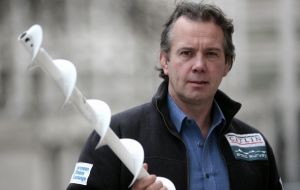MercoPress. South Atlantic News Agency
British team treks to North Pole to measure ice sheet
 British explorer Pen Hadow
British explorer Pen Hadow British team has begun a gruelling trek to the North Pole to discover how quickly the Arctic sea-ice is melting.
Renowned Arctic explorer Pen Hadow and two companions were dropped onto the ice by plane 800 kilometres off the northern coast of Canada on Saturday. During their 1,000km journey they plan to take measurements of the thickness of the ice. It will be the most detailed survey of its kind this season, and should be completed in late May. BBC environment correspondent David Shukman said that where there were gaps in the ice, the team would put on survival suits and swim. At the rear of one sledge is a mobile radar unit which will constantly measure the thickness of the ice. Satellites have shown how the area of Arctic sea-ice has been shrinking in recent years, but this expedition should give scientists a better idea of how thin the ice is becoming. The sea-ice is widely believed to be melting at an increased rate because of warmer air temperatures above the ice and because of warmer waters below it. The major scientific institutions and agencies that study the Arctic attribute the changes to global warming. Only a few years ago, researchers predicted that by the end of this century the Arctic could be free of ice in summer. Some now say that could come far sooner. Mr Hadow, 46, and the other members of the British Catlin Arctic Survey group, Ann Daniels, 44, and Martin Hartley, 40, will attempt to gather important new data about the state of the ice in winter and early spring - when the ice reaches its greatest extent. It is intended to give scientists the very latest "ground truth", to better constrain their models and their interpretation of the observations coming from satellites. Arctic ice modeller Professor Wieslaw Maslowski, a science adviser to the survey, hopes the data will enable him to refine his forecast of when the first ice-free summer might arrive. Currently, he has it down for 2013 - but with an uncertainty range between 2010 and 2016. Mr Hadow, a father-of-two from Hexworthy, Devon, became the first person to trek solo and without support from Canada to the North Pole in 2003. He said this expedition - which could last up to 100 days - would be about science and discovery. "What we're really doing is deploying [what are] usually considered bizarre or socially irrelevant skills and expertise and experience of being able to make these sorts of journeys across the surface of the sea ice and bending them to the needs of the scientific community," he said. "We're making the surface journey because that's the only way we have of gathering these direct observations of how thick the snow and the ice is. That's what the scientists really need to know." He added: "If, as scientists tell us, the ice is thinning quickly, then it should set alarm bells ringing around the world." He said each member of the team would be dragging a sledge weighing up to 120kg - "a very heavy rugby player" for about 12 hours a day. And his biggest fear, he said, was the prospect of having to swim with all of his equipment for up to two hours at a time in darkness. Mr Hartley, from Hackney, east London, is also the expedition photographer. Ms Daniels, a mother-of-four from Whimple, Devon, will be navigating. They will be re-supplied every 20 to 25 days on their mission but have had to put on excess weight because, although they will be taking in 6,000 calories a day, they will be using up around 7,500 calories.




Top Comments
Disclaimer & comment rulesCommenting for this story is now closed.
If you have a Facebook account, become a fan and comment on our Facebook Page!